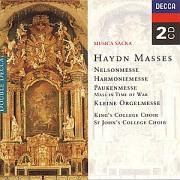| All Artists: Tom Krause, Franz Joseph Haydn, Academy of St. Martin-in-the-Fields, London Symphony Orchestra, Brian Runnett, John Scott, Simon Preston, Stephen Cleobury, April Cantelo, Erna Spoorenberg, Jennifer Smith, Sylvia Stahlmann, Alexander Young, Robert Tear, Wilfred Brown Title: Haydn Masses - Nelsonmesse ~ Harmoniemesse ~ Paukenmesse ~ Kleine Orgelmesse Members Wishing: 1 Total Copies: 0 Label: Decca Release Date: 8/12/1997 Genre: Classical Styles: Opera & Classical Vocal, Historical Periods, Classical (c.1770-1830) Number of Discs: 2 SwapaCD Credits: 2 UPC: 028945502021 |
Search - Tom Krause, Franz Joseph Haydn, Academy of St. Martin-in-the-Fields :: Haydn Masses - Nelsonmesse ~ Harmoniemesse ~ Paukenmesse ~ Kleine Orgelmesse
 | Tom Krause, Franz Joseph Haydn, Academy of St. Martin-in-the-Fields Haydn Masses - Nelsonmesse ~ Harmoniemesse ~ Paukenmesse ~ Kleine Orgelmesse Genre: Classical
|
Larger Image |
CD Details |
CD ReviewsGlorious masterpieces, glorious recordings... 12/26/2000 (5 out of 5 stars) "Deeply moving recordings of Haydn's awesome choral masterpieces. The conducting and singing are both impeccable and powerful, and London's acoustics are great. The soprano in the Nelson mass sings like an angel, and the organ shines through well. It was one of the earliest recordings to use Haydn's actual orchestration. The Nelson mass is available on a 24 bit CD in the Decca Legends series along with a great Handel Coronation anthem with the "God Save the King" chorus. Now back to this set... I love the kettle drum "military" portion of the Agnus Dei in the Mass in Time of War. The organ is quite charming in the Little Organ Mass, and the Harmonienmasse is sublime. The Teresienmasse is not included though. If you like Haydn's masses, don't miss the powerful The Seven Last Words of Christ(not to be confused with Haydn's string quartet set with the same title), its finale will carry you beyond this world. Haydn's TeDeum is also quite magnificent." A generous choice Larry VanDeSande | Mason, Michigan United States | 04/06/2007 (5 out of 5 stars) "This inexpensive twofer mixes perhaps the best work from London's 10-CD box of Haydn's complete masses recorded during the 1960s. With sparkling solo and choral singing and playing that was among hte best of its era, this set will provide insight into Haydn performance for collectors that only know his music through modern period practice performers such as Gardiner and Hickox. Old Haydn style is clearly on display in David Willcocks' 1962 Missa in tempori belli, or mass in time of war or "Nelson" mass celebrating Admiral Nelson's victory over Napoleon at the Nile. Four and one-hald decades later this is still among the best versions of this music ever recorded. Aside from "The Creation", Haydn hardly penned a better piece of vocal music. Willcocks probably does not have a better recording to his name. Another magnificent departure from today's period performance practice is George Guest's "Paukenmesse" and the way he features the kettledrum, espcially in the closing pages. Compared to the Gardiner period version, where the big drum is used less often and to less advantage, this must be considered a full throated attack in keeping with the composer's wishes. The one shortcoming of the set is it divides the Paukenmesse over two CDs. This aside, no one will be disappointed with this set unless they are so dogmatic they can't set aside modern practice to accept instrumental and choral work that set a standard for 30 years." Good Choice DC | 08/14/2006 (4 out of 5 stars) "I ordered this just to have Harmoniemesse but was happy to have the other pieces also. It's a nice variety of vocal arrangements. Recording is clear and chorus is good, sopranos sounding like boys choir. Ending of some phrases loses pitch sometimes but not enough to offend a sensetive ear."
|

 Track Listings (14) - Disc #1
Track Listings (14) - Disc #1